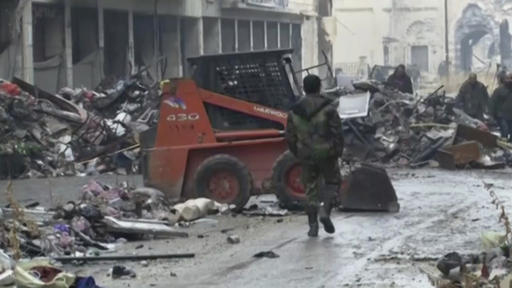If seeing is believing, it follows that believing is seeing. As subjective creatures by nature, we humans are susceptible to confirmation bias, seeing only that which aligns with what we believe about the world. We do a lot of seeing now, on LCD screens and city sidewalks, dissecting, interpreting, and judging people important and not, local and afar, known and unknown.
We want to be seen. When you give people an old fancy typewriter to try out or a new laptop with Word to connect to the wider world, they nearly always start by writing their name. We are enthralled by the self, obsessed with how we are perceived and remembered. Much ink has been spilled over “vapid, image-obsessed” millennials, but selfie-culture and over-sharing on social media are more symptomatic of the human condition than indicative of a generational failing.
So what does it mean that we continually see atrocities and fail to respond with action? Late Tuesday, a hasty ceasefire was negotiated in the Syrian city of Aleppo; by Wednesday, numerous news outlets on the ground reported renewed shelling as civilian evacuation plans fell apart. The Russian Defense Ministry confirmed that the government had resumed attacks, claiming rebel forces broke the terms of the peace agreement early Wednesday morning.
Syria has been a staple in the public eye since conflict erupted in the country in 2011, with more widespread social-media awareness ramping up in 2014. We’ve seen kids pulled from rubble on video, bodies upon bodies, craters from government shelling turned into makeshift swimming pools, drowned refugees funeral shrouded in emergency blanket. The Syrian conflict is the deadliest conflict of the 21st century to date, but it has received a fraction of the media attention given to the Iraq War. Part of this is because of the nature of the conflict; unlike Iraq or Afghanistan, there are currently only 300 American soldiers on the ground in Syria, with an additional 200 being deployed this week.
Much like American involvement in Libya, military operations in Syria have been more remote, and thus less sensational for news headlines. The lack of a true stake in the situation beyond “doing the right thing” certainly doesn’t make for news people will consider urgent, particularly as the Syrian civil war has coincided with a period of deep domestic unrest in the U.S. In recent years, issues such as anti-blackness, sexual assault, the environment, queerphobia, political scandal, and xenophobia have weighed heavily on the American political psyche, drowning out global issues in domestic discord.
Yet in the Syrian conflict, The Daily Iowan Editorial Board sees parallels not to contemporary military conflicts in the Middle East but to racialized environmental justice struggles here at home. Flint, Michigan, still does not have clean water; a bill was only just passed in the Senate to allocate significant funds to water infrastructure in the city. Despite consistent media attention on the lead-contaminated water pouring from the city’s taps, many simply witnessed the pain of others and treated it as a news story. If seeing is believing, then believing is seeing. If believing is seeing, we have to face the fact that many of us don’t truly believe in the humanity of others, whether they be our fellow Americans in Flint or our fellow humans in Aleppo.










